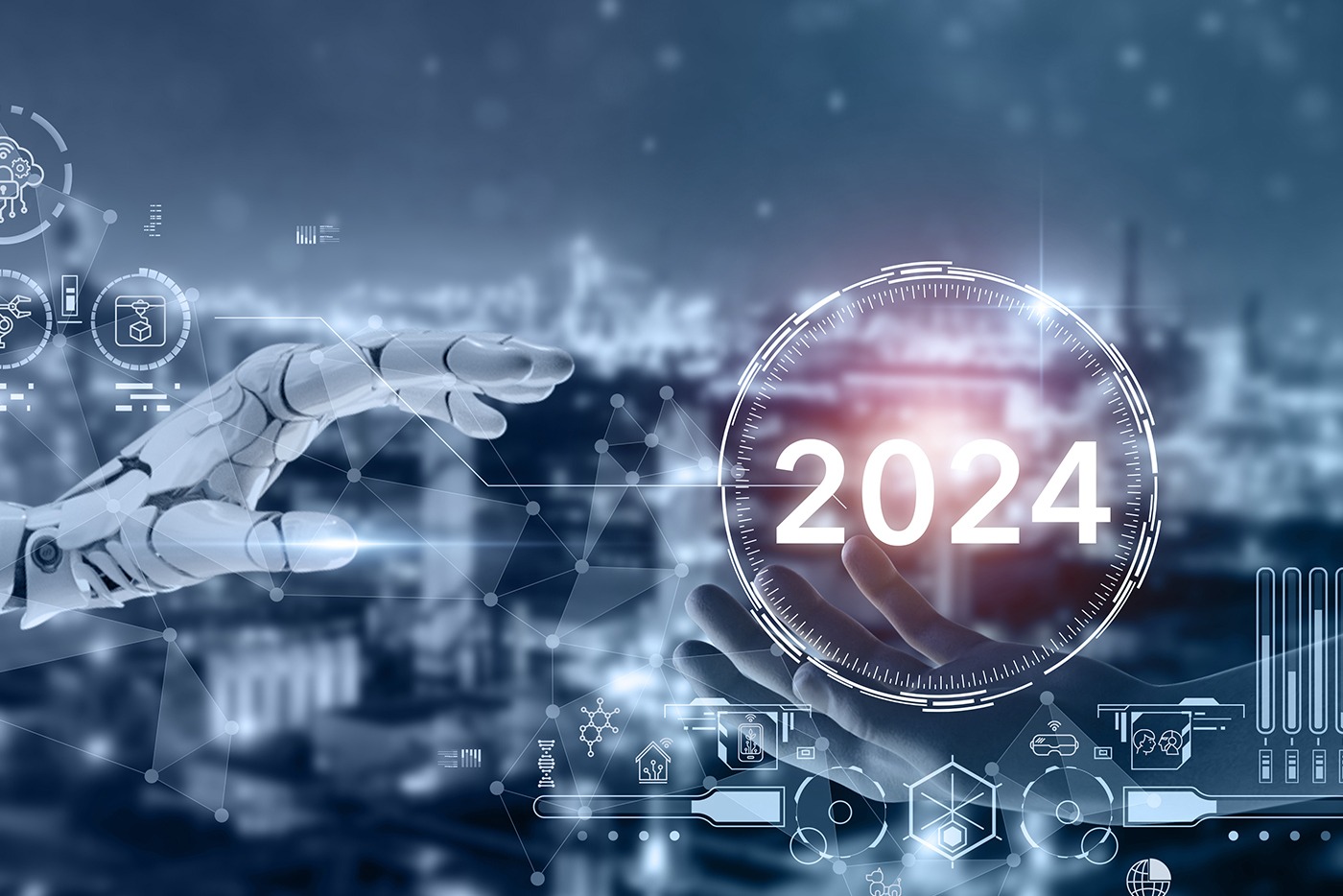Navigating The Future: 10 Global Trends That Will Define 2024
12 November 2023
We’re approaching the mid-point of a decade in which we’ve already seen significant global transformation. War, pandemic, economic turbulence, and shifts in political power both within nations and at the international level mean the world is quite different than it was at the start of 2020.

These major trends will continue to reshape society, and we can only expect the pace of change to increase. For many, environmental concerns are clearly at the top of the agenda, and the need to mitigate the impact of climate emergency will bring profound change.
At the same time, powerful and often frightening new technologies that we’re told have the potential to bring significant benefits to society, as well as cause unprecedented harm, will be a catalyst for further transformations.
With this in mind, here’s a rundown of what I believe will be the most significant global trends in 2024. These are issues that will impact the lives of everyone on the planet, and how they play out will have profound implications for the second half of the decade and beyond.
The Rise Of Intelligent Machines
In 2024, artificial intelligence (AI) is a part of everyday life and virtually no industry or aspect of our lives is untouched by it. While it’s undoubtedly driving innovation and creating efficiencies in fields as diverse as healthcare, space travel and ecological conservation, it’s also causing a fair amount of fear and uncertainty. The threat to jobs is real – although it will undoubtedly create new opportunities, just as it creates redundancies. There are also concerns that handing over control of our lives to algorithms can exacerbate divisions and inequality in society. In truth, no one knows where the AI revolution will take us as a society or as a species, but our actions in 2024 will be critical to setting us on a path that leads to a happy outcome.
Climate Change Increasingly A Political Issue
If we follow the science, it’s clear that the urgency of averting the catastrophic effects of climate change is rapidly escalating as we enter 2024. Often, we are counting on technology to play a critical role, and innovations like clean energy and carbon capture will be part of the solution. However, the willingness of individuals and organizations to take responsibility, as well as the way that the political and economic trends mentioned here play out, will probably be even more critical. How much pain people will be willing to take on in order to reduce their environmental footprint will become an increasingly contentious issue in politics. 2024 represents a critical opportunity to find out whether the will exists to make changes and tough decisions needed to avoid some very nasty shocks in the near future.
Elections Will Determine The Course Of Democracy In The Second Half Of The Decade
Elections bring the opportunity for change, and 2024 will see leadership contests in a number of countries where a swing in the balance of power could have profound global implications. Citizens in the US, European Union, India, UK and Russia will be among those taking to the ballots (with varying degrees of opposition to incumbent powers.) In many of these nations, there is growing polarization between progressive and conservative, or nationalist and internationalist parties and voters. Victory is likely to embolden the winners – whatever side of the divide they occupy – to believe they have a remit to enact further social change. Whichever way the cookie crumbles, this is likely to impact the course of every other trend on this list in 2024 and throughout the second half of the decade.
Turbulent Times For Economies
A continuing slowdown in global economic growth is predicted for 2024, threatening widespread knock-on effects on many aspects of society. Hard economic times typically result in governments choosing to reduce spending on public services and utilities, job cuts, a reduction in living standards and a growth in civil unrest. Slow growth also threatens national and international efforts to hit carbon net zero targets, which could have severe consequences. The possibility of a recession in the USA, a slowdown in China’s growth, and the ongoing conflicts in Ukraine and Israel are all factors. At the same time, growth in emerging countries, including Brazil, India, Mexico and Turkey, will lead us into an era where we will witness drastic changes in the overall balance of global economic power.
The Evolution Of Work
Changes to the way we work will continue to have an impact on many aspects of our lives and society. Although some companies are implementing back-to-office policies, remote and hybrid working remain at far higher levels than they were before the pandemic. This has the effect of improving global mobility, with workers no longer tied down to living in areas close to employment centers. However, it can also lead to increased social isolation and social cohesion. Managing this change will be an important challenge for organizations and individuals in 2024.
The Generation Gap
The gap between generations in terms of wealth and property ownership will continue to drive global and social change in 2024. According to research conducted in 2023, the median wealth of millennials (born early eighties to late nineties) is less than half that of baby boomers (born mid-fifties to mid-sixties) at the same age. This could possibly lead to reduced social mobility as well as political polarization, bringing with it the danger of disenfranchised voters being drawn to populist or extremist political parties.
Ongoing Urbanization
By 2050, the UN projects that 66 percent of the world’s population will live in urban areas – up from 56 percent in 2022. While this has the potential to drive economic growth and prosperity, it also brings other challenges, such as overcrowding, pollution and increased cost of living. Tackling the impact of this huge change in many people’s way of life will be a priority for governments and industry in the coming years. Resources will also be needed to mitigate the effects of the brain drain on those who stay behind, many of whom are already underserved by essential services like power, healthcare and online connectivity.
Culture Wars
The term culture war refers to an ongoing polarization of society, often characterized by a left versus right or liberal versus conservative debate and largely conducted via social as well as what is increasingly called legacy media. The impact of this on society is clearly driven by the emergence of the internet as a tool that can be used to find information, including disinformation and propaganda. Much has been written in recent years about the echo chamber effect of online discourse in an ecosystem ruled by algorithms. Increasingly, we see audiences steered towards content that’s likely to confirm their biases while also inflaming feelings of injustice or inequality. Issues such as immigration, conspiracy theories and social justice stir heated feelings on both sides of the debate, but it isn’t just idle chit-chat. Divisive views spread via social media increasingly inform political policy, as can be seen from the rise of populist parties and policies around the globe, and even stoke extremist terrorism.
Rethinking Education
Gone are the days when education was only for the young. Work is changing, so the models of learning needed to prepare for work are changing, too. The speed of technological innovation means opportunities are opening up in industries that didn’t even exist when much of today’s workforce was at school. In advanced nations, there’s a shift towards lifelong learning, partly enabled by the emergence of online and remote learning technology. Employers will increasingly recognize the importance of reskilling and upskilling valuable workers, particularly as longer lifespans and later retirement lead to an older workforce. In emerging economies, we will see a growing demand for teachers as more of the population moves out of poverty. Again, new models of delivering education will be needed to serve the citizens of crowded megacities as well as children in remote rural areas.
Migration And Movement
Between 1970 and 2020, the number of people living in a country other than the one they were born in more than tripled. In 2024, some will be refugees fleeing war, some will be economic migrants in search of a better life, and some will be looking to escape to parts of the world where life is not yet overly disrupted by rising temperatures and sea levels. Economies will continue to benefit from an influx of mostly young, able-bodied and active workers. And fears of the strain that could be put on utilities and public services, or the impact of new arrivals on indigenous populations, will continue to fuel political division. In advanced economies, the offer of jobs, visas and education opportunities will increasingly be used to plug the skills gap and in trade negotiations with nations with emerging consumer markets.
Related Articles
The Two-Tier AI Economy: Why Half Of Companies Are Being Left Behind And How To Close The Gap
By now, “smart” versions exist of just about every home appliance, gadget and gizmos we can think of. However, manufacturers continue[...]
5 AI-Era Skills Mistakes That Will Cost Your Business Millions In 2026
By now, “smart” versions exist of just about every home appliance, gadget and gizmos we can think of. However, manufacturers continue[...]
Dreamforce 2025 Proved The Agentic Enterprise Has Arrived
By now, “smart” versions exist of just about every home appliance, gadget and gizmos we can think of. However, manufacturers continue[...]
AI Chatbots Are Quietly Creating A Privacy Nightmare
By now, “smart” versions exist of just about every home appliance, gadget and gizmos we can think of. However, manufacturers continue[...]
What Is Zero Click And Why Is It Turning Marketing On Its Head?
By now, “smart” versions exist of just about every home appliance, gadget and gizmos we can think of. However, manufacturers continue[...]
How Globant Is Reinventing Professional Services With AI Pods And Subscription Models
By now, “smart” versions exist of just about every home appliance, gadget and gizmos we can think of. However, manufacturers continue[...]
Sign up to Stay in Touch!
Bernard Marr is a world-renowned futurist, influencer and thought leader in the fields of business and technology, with a passion for using technology for the good of humanity.
He is a best-selling author of over 20 books, writes a regular column for Forbes and advises and coaches many of the world’s best-known organisations.
He has a combined following of 4 million people across his social media channels and newsletters and was ranked by LinkedIn as one of the top 5 business influencers in the world.
Bernard’s latest book is ‘Generative AI in Practice’.










Social Media